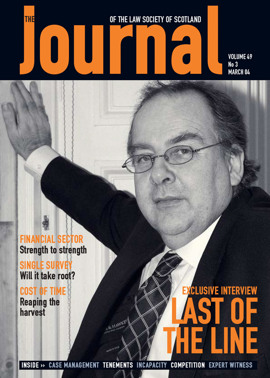Are landlords' fears justified?
In response to Mr Finnie’s article in last month’s Journal I believe that the new forms of tenancy introduced by the Agricultural Holdings (Scotland) Act 2003 will, in due course, be used.
In mitigation of solicitors, it seems inevitable in a period of uncertainty in the farming industry, when the “threat” of absolute right to buy has, despite the Act, not (as landlords see it) been dispelled, that things will take time to bed down – especially as that uncertainty has been exacerbated by the mid-term review of the Common Agricultural Policy, which has lawyers wrestling with how to secure Single Farm Payment to a farm becoming vacant between the end of the base years (2000-02) and attachment in 2005.
The greatest uncertainty created by the Act undoubtedly concerns fixed equipment. Section 16(3) imports into both short limited and limited duration tenancies an obligation on landlords “at the commencement of the tenancy” to “put the fixed equipment … into a thorough state of repair and … provide such buildings and other fixed equipment as will enable an occupier reasonably skilled in husbandry to maintain efficient production”. Subsection (6) provides: “Any agreement …which purports to provide for the tenant to bear any expense of any work which the landlord is required to execute in order to fulfil the landlord’s obligations under the lease is of no effect” – i.e. post-lease agreements varying the statutory obligations are no longer permitted. The balance in relation to the provision of fixed equipment at the commencement of the tenancy has, therefore, swung back against the landlord.
This does not seem unreasonable. Post-lease agreements were widely used to require tenants to accept out of date, dilapidated buildings as being in a thorough state of repair while binding them to leave those same buildings in a thorough state of repair at outgo. Tenants saw this as unfair.
The second part of the obligation (provide such fixed equipment as will enable efficient production) is more burdensome, if one accepts the recent interpretation by some landlords that tenants are given carte blanche to demand that landlords provide fixed equipment which is not necessary for the holding. That, in my opinion, is a biased construction.
First, the obligation is to provide fixed equipment which enables an occupier reasonably skilled in husbandry to maintain production. Thus, if the landlord can show that an occupier other than the tenant could farm the holding, efficiently, with the fixed equipment provided, he can, in my opinion, resist unreasonable demands by the tenant to provide other fixed equipment. That said, an argument could also be advanced that, if the tenant is a neighbouring farmer and shows that a hypothetical occupier who has no other farm could not farm efficiently without buildings, the landlord must provide them. There is clearly a difficulty in marrying the section 16 requirements with the let of bare land.
Secondly, the landlord’s obligation relates to maintaining efficient production “as respects both (i) the kind of produce specified in the lease, or (failing such specification) in use to be produced on the land; and (ii) the quality and quantity of such produce”. These qualifications must limit the fixed equipment the landlord has to provide. For example, if the lease specifies a let as a hill sheep farm, the landlord would not be obliged to provide a dairy. Nor in my view does the tenant’s right to freedom of cropping affect the obligation being restricted to fixed equipment required to enable an occupier to use the holding for the purpose specified in the lease.
Thirdly, section 16(1) provides that when a SLDT or LDT is entered into, “any fixed equipment … is to be specified in the lease”. This poorly drafted provision can be construed variously. It might, for example, mean that you have to specify all fixed equipment whether or not it is required to fulfil the section 16(3) obligations. But that, it seems to me, is a nonsense. It is much more likely that, reading subsections (1) and (3) together, the lease is required to specify only the fixed equipment which by subsection (3) the landlord is obliged to provide. On that reading, the provision is designed to set in stone the fixed equipment which the parties themselves agree is required for the holding, further restricting the landlord’s obligation – a view fortified by subsection (2) which provides that any further specification of fixed equipment, or any variation to the original specification, can only be made by written agreement. Does this, perhaps, provide an answer to the bare land problem?
In summary, I suggest that section 16 need not hold the fear for landlords which has recently been put into them, although a question mark does, undoubtedly, hang over how you establish a bare land let.
Alasdair G Fox, Anderson Strathern WS
In this issue
- Consumers and their guardians
- For the United Kingdom?
- Law meets its maker
- Falconer's safe landing
- Competition and the solicitor
- Flying the flag in finance
- Last piece of the jigsaw
- A good year for most firms
- System addicts
- Putting theory into practice
- The corporate challenge
- Make money out of IT
- A first-rate presentation
- The usual experts?
- Obituary: David Stewart Williamson
- Pearls of wisdom
- Work in progress
- The quality assurance scheme
- Fair hearing with prior knowledge?
- Scottish Solicitors' Discipline Tribunal
- Managing the timetable
- Are landlords' fears justified?
- Caps the stars don't want
- Website reviews
- Book reviews
- Best foot forward?
- The new law of real burdens






